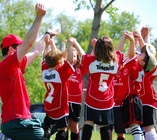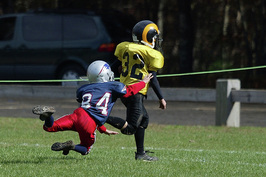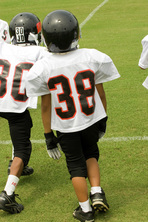 Your children will become what you are; so be what you want them to be. - David Bly My oldest son’s team was in a Columbus Day Tournament this past fall. Their team won every game until their last game, when they competed against another team that was very good at playing soccer. I will never forget the other team. The only problem is, I won’t remember them for the way they played, I will remember them for how the adults on their team acted. From the minute the game started, their coaches and fans were screaming at the referee. The adults argued every time one of their boys were touched – they argued every throw-in, every goal kick, every off sides. If given the chance, these people would have argued what color the sky was that day. The coaches had created such an uncomfortable, irrational environment that it would have almost been comical had I not been so involved. I had a pit in my stomach from the time the game started. To the credit of the boys on this team, they played a hard, clean game. However I have been around this game long enough to know that eventually these boys will probably start being what they see. What we as adults need to remember is that we represent our teams and our towns as much as the players on the field do – maybe even more. Most important is that we represent ourselves and, believe me, our kids are watching! Next time you are at a game, take a very close look at yourself and your behavior, and ask: "Is this what I want my children to be?"
0 Comments
 Did you ever notice how much coaching goes on during a child's sports game? When parents coach from the sidelines it sometimes leads to information overload, misinformation or increases the pressure on these young athletes. I have heard some compare game day to taking a test in school. By practicing, the kids are doing their homework to prepare for the test - or in this case, the game. Imagine what a classroom would be like on test day if you had three teachers standing on one side of the room and a line of parents on the other all screaming directions to the students at their desks. Now envision the teachers and parents yelling out conflicting instructions. Coaches (me included) need to do a better job of not coaching on game day. Just let the kids play. Allow them to think for themselves. See what the players do without constant feedback. Remember it's their test and their time to shine. Say most of what you have to say at half-time or after the game. When parents attempt to coach their children during a game, it can not only be very distracting but counter-productive. I can't tell you how many times I have seen parents give their children incorrect feedback or information that contradicts the coach's expectations. I also have seen parents use poor timing; when a child is in the process of executing a skill, it is probably not the best time to yell at them and yet I see it all the time. Try to sit down and enjoy your child's game. Encourage your kids, cheer them on, but don't coach! Coach your child at home if you need to, not at practice or during warm-ups and definitely not during games. If you can't help yourself, then maybe you should sign up to be a team coach.  I believe that our society sends extremely mixed messages to our children in regard to sports competition. We tell them that the games are just for fun. If the games are just for fun why do we spend so much money on personal training, coaching, and top notch uniforms? If the games are just for fun then why do some adults act the way they do at children's games? I have seen kids who have won get reprimanded for being over-excited. (We don't want to hurt anyone's feelings). I have seen kids who have lost get reprimanded for poor play. When kids first start playing sports the games all end in "ties" or no score is kept at all. Understandably the early years focus on fun and fundamentals. However it seems to me, that the shift from enjoyment to competition is usually a pretty quick one. Maybe they would be better equipped to handle winning and losing if we didn't try so hard to shield them from it. Being a physical education teacher gives me the awesome opportunity to teach children about competition on a daily basis. What I have learned from them is that, most children I first meet are not quite sure how to answer this question: is it okay to want to win? As long as we teach our children that it is not okay to win at all costs and that losing marks the end of the game, not the end of the world then is it okay to want to win? I say absolutely YES! |
Categories
All
Contact Mark
Send feedback or topic ideas to Mark. About Mark
Mark Housel, owner of Housel Fun and Fitness, began playing soccer at 7. He has been involved in the sport his whole life - as a player in high school and college and since graduating college he has been active as a paid and volunteer coach. Archives |
 RSS Feed
RSS Feed
